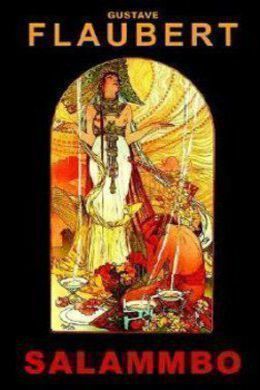
-
EPUB 322 KB
-
Kindle 449 KB
-
Support epubBooks by making a small $2.99 PayPal donation purchase.
Description
An historical novel that interweaves historical and fictional characters. The action takes place immediately before and during the Mercenary Revolt against Carthage in the third century BC. This book, which Flaubert researched painstakingly, is largely an exercise in sensuous and violent exoticism. The Carthaginian costumes described therein even left traces on the fashions of the time. Nevertheless, in spite of its classic status in France, it is practically unknown today among English-speakers.
422 pages with a reading time of ~6.50 hours (105524 words), and first published in 1862. This DRM-Free edition published by epubBooks, 2010.
Community Reviews
There are currently no other reviews for this book.
Excerpt
It was at Megara, a suburb of Carthage, in the gardens of Hamilcar. The soldiers whom he had commanded in Sicily were having a great feast to celebrate the anniversary of the battle of Eryx, and as the master was away, and they were numerous, they ate and drank with perfect freedom. The captains, who wore bronze cothurni, had placed themselves in the central path, beneath a gold–fringed purple awning, which reached from the wall of the stables to the first terrace of the palace; the common soldiers were scattered beneath the trees, where numerous flat–roofed buildings might be seen, wine–presses, cellars, storehouses, bakeries, and arsenals, with a court for elephants, dens for wild beasts, and a prison for slaves. Fig–trees surrounded the kitchens; a wood of sycamores stretched away to meet masses of verdure, where the pomegranate shone amid the white tufts of the cotton–plant; vines, grape–laden, grew up into the branches of the pines; a field of roses bloomed beneath the plane–trees; here and there lilies rocked upon the turf; the paths were strewn with black sand mingled with powdered coral, and in the centre the avenue of cypress formed, as it were, a double colonnade of green obelisks from one extremity to the other. Far in the background stood the palace, built of yellow mottled Numidian marble, broad courses supporting its four terraced stories. With its large, straight, ebony staircase, bearing the prow of a vanquished galley at the corners of every step, its red doors quartered with black crosses, its brass gratings protecting it from scorpions below, and its trellises of gilded rods closing the apertures above, it seemed to the soldiers in its haughty opulence as solemn and impenetrable as the face of Hamilcar. The Council had appointed his house for the holding of this feast; the convalescents lying in the temple of Eschmoun had set out at daybreak and dragged themselves thither on their crutches. Every minute others were arriving. They poured in ceaselessly by every path like torrents rushing into a lake; through the trees the slaves of the kitchens might be seen running scared and half–naked; the gazelles fled bleating on the lawns; the sun was setting, and the perfume of citron trees rendered the exhalation from the perspiring crowd heavier still. Men of all nations were there, Ligurians, Lusitanians, Balearians, Negroes, and fugitives from Rome. Beside the heavy Dorian dialect were audible the resonant Celtic syllables rattling like chariots of war, while Ionian terminations conflicted with consonants of the desert as harsh as the jackal’s cry. The Greek might be recognised by his slender figure, the Egyptian by his elevated shoulders, the Cantabrian by his broad calves. There were Carians proudly nodding their helmet plumes, Cappadocian archers displaying large flowers painted on their bodies with the juice of herbs, and a few Lydians in women’s robes, dining in slippers and earrings. Others were ostentatiously daubed with vermilion, and resembled coral statues. They stretched themselves on the cushions, they ate squatting round large trays, or lying face downwards they drew out the pieces of meat and sated themselves, leaning on their elbows in the peaceful posture of lions tearing their prey. The last comers stood leaning against the trees watching the low tables half hidden beneath the scarlet coverings, and awaiting their turn. Hamilcar’s kitchens being insufficient, the Council had sent them slaves, ware, and beds, and in the middle of the garden, as on a battle–field when they burn the dead, large bright fires might be seen, at which oxen were roasting. Anise–sprinkled loaves alternated with great cheeses heavier than discuses, crateras filled with wine, and cantharuses filled with water, together with baskets of gold filigree–work containing flowers. Every eye was dilated with the joy of being able at last to gorge at pleasure, and songs were beginning here and there. First they were served with birds and green sauce in plates of red clay relieved by drawings in black, then with every kind of shell–fish that is gathered on the Punic coasts, wheaten porridge, beans and barley, and snails dressed with cumin on dishes of yellow amber. Afterwards the tables were covered with meats, antelopes with their horns, peacocks with their feathers, whole sheep cooked in sweet wine, haunches of she–camels and buffaloes, hedgehogs with garum, fried grasshoppers, and preserved dormice. Large pieces of fat floated in the midst of saffron in bowls of Tamrapanni wood. Everything was running over with wine, truffles, and asafoetida. Pyramids of fruit were crumbling upon honeycombs, and they had not forgotten a few of those plump little dogs with pink silky hair and fattened on olive lees,—a Carthaginian dish held in abhorrence among other nations.
